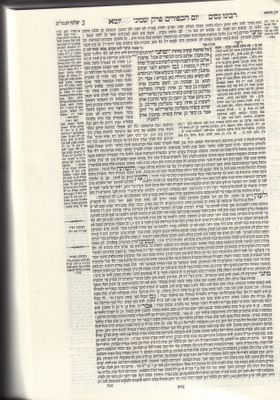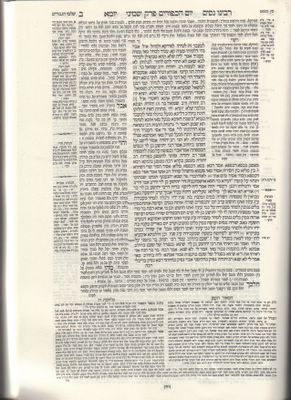
HIDE/SHOW IMAGE
5b
{Yoma 85a continues}
But he who has on his conscience the defamation {profaning} of God {=chillul haShem}, neither penitence can suspend, nor Yom Kippur for, nor sufferings wipe out. But all the three only suspend, and death wipes out, as it is written {Yeshaya 22:14}:
Rav said: If one such as myself takes meat from the butcher, and does not immediately pay.
Rabbi Yochanan said: If one such as myself walks four cubits without Torah or tefillin.
Rav Nachman bar Yitzchak said: When people say of a man: "His Master should pardon him for his deeds."
Rav Yitzchak bar Rav Dimi said: When a man's companions are ashamed of his reputation. {see gemara for alternate girsa}
The Sages learnt {in a brayta}: When a man reads and learns {Torah}, attends to Torah scholars, speaks gently with other people, his buying and selling in the market are pleasant and his business dealing are conducted in a trustworthy fashion, what do the people say about him? Fortunate is Ploni who has learned Torah! Fortunate is his father and fortunate is his teacher who has taught him Torah! Woe to those people who do not learn Torah. Ploni learned Torah and you see how beautiful are his ways and how proper are his actions. Upon him Scriptures states {Yeshaya 49:3}:
| ג וַיֹּאמֶר לִי, עַבְדִּי-אָתָּה--יִשְׂרָאֵל, אֲשֶׁר-בְּךָ אֶתְפָּאָר. | 3 And He said unto me: 'Thou art My servant, Israel, in whom I will be glorified.' |
Rabbi Chama bar Chanina said: Repentance is great in that it brings healing to the world, as it is written {Yirmiyahu 3:22}:
because of your repentance}
Rabbi Levi said: Great is repentance, for it reaches the Throne of Glory. As is written {Hoshea 14:2}
| ב שׁוּבָה, יִשְׂרָאֵל, עַד, ה אֱלֹקֶיךָ: כִּי כָשַׁלְתָּ, בַּעֲוֹנֶךָ. | 2 Return, O Israel, unto the LORD thy God; for thou hast stumbled in thine iniquity. |
{Yoma 86b}
What is a baal teshuva {a penitant man}?
Such that a sin comes to his hand and he separates himself from it.
Rav Yehuda adds: With the same place, the same time, and the same woman.
Rav yehuda said: Rav would contrast {verses}.
It is written {Mishlei 28:13}:
| יג מְכַסֶּה פְשָׁעָיו, לֹא יַצְלִיחַ; וּמוֹדֶה וְעֹזֵב יְרֻחָם. | 13 He that covereth his transgressions shall not prosper; but whoso confesseth and forsaketh them shall obtain mercy. |
| א לְדָוִד, מַשְׂכִּיל: אַשְׁרֵי נְשׂוּי-פֶּשַׁע; כְּסוּי חֲטָאָה. | 1 [A Psalm] of David. Maschil. Happy is he whose transgression is forgiven, whose sin is pardoned. |
This is no contradiction. Here refers to sins between man and God while there it refers to sins between man and his fellow.
They learnt {in a brayta}: If one commits a sin one time he is forgiven; twice, he is forgiven; three times, he is not forgiven. For it is stated {Iyyov 33:29}:
| כט הֶן-כָּל-אֵלֶּה, יִפְעַל-אֵל-- פַּעֲמַיִם שָׁלוֹשׁ עִם-גָּבֶר. | 29 Lo, all these things doth God work, twice, yea thrice, with a man, |
This is no question. Here is individually, and here is in public.
And we learn in perek seder taaniyot {Taanit 16a}:
The Sages learnt {in a brayta}: If a man has a transgression in hand and confesses, and returns to it, to what is he compared? To a man who grabs a sheretz {source of ritual impurity} in hand, even if he immerses in all the waters of the world his immersion does not count for him. If he throws it from his hand, immediately his immersion counts for him. For it is written {Mishlei 28:13}
| יג מְכַסֶּה פְשָׁעָיו, לֹא יַצְלִיחַ; וּמוֹדֶה וְעֹזֵב יְרֻחָם. | 13 He that covereth his transgressions shall not prosper; but whoso confesseth and forsaketh them shall obtain mercy. |
| מא נִשָּׂא לְבָבֵנוּ אֶל-כַּפָּיִם, אֶל-אֵל בַּשָּׁמָיִם. | 41 Let us lift up our heart with our hands unto God in the heavens. |
| יא כְּכֶלֶב, שָׁב עַל-קֵאוֹ-- כְּסִיל, שׁוֹנֶה בְאִוַּלְתּוֹ. | 11 As a dog that returneth to his vomit, so is a fool that repeateth his folly. |
Rabbi Eliezer ben Yaakov says: All the more is he praiseworthy, for it is written {Tehillim 51:5}:
| ה כִּי-פְשָׁעַי, אֲנִי אֵדָע; וְחַטָּאתִי נֶגְדִּי תָמִיד. | 5 For I know my transgressions; and my sin is ever before me. |
For Rav Huna said: Once one commits a sin and repeats it, it is permitted to him. It is permitted to him, do you truly think?! Rather, say, it seems to him like something permitted.
And he needs to delineate the sin. For it is written {Shemot 32:31}:
Rabbi Akiva says: He need not.
Rather, to what will I apply וַיַּעֲשׂוּ לָהֶם, אֱלֹהֵי זָהָב - "and have made them a god of gold?" Like Rabbi Yannai. For Rabbi Yannai said: Moshe said before Hashem: Master of the World! Because of the silver and gold that you showered upon Israel until they said "Enough!" caused them to make a god of gold.
{Yoma 86b}
We expose the hypocrites because of chillul hashem {profaning God's name} for it is written Yechezkel 3:20:
{Yoma 87a}
Anyone who causes the public to merit to do mitzvot, he will not be able to come to a sin {for Hashem will push away the chance of sinning so that he does not come to do it} so that it will not be that his students inherit the World to Come and he descends to Sheol {the underworld}. For it is written {Tehillim 16:10}:
| י כִּי, לֹא-תַעֲזֹב נַפְשִׁי לִשְׁאוֹל; לֹא-תִתֵּן חֲסִידְךָ, לִרְאוֹת שָׁחַת. | 10 For Thou wilt not abandon my soul to the nether-world; neither wilt Thou suffer Thy godly one to see the pit. |
| יז אָדָם, עָשֻׁק בְּדַם-נָפֶשׁ-- עַד-בּוֹר יָנוּס, אַל-יִתְמְכוּ-בוֹ. | 17 A man that is laden with the blood of any person shall hasten his steps unto the pit; none will support him. |
Mishna:
To him who says: "I will sin, repent, sin again, and repent again," is not given the opportunity to repent.
For him who thinks, "I will sin; Yom Kippur will atone for my sins," Yom Kippur does not atone.
A sin towards God, Yom Kippur atones for; but a sin towards his fellowman is not atoned for by Yom Kippur so long as the wronged fellowman is not righted.
Upon ths Rabbi Eleazer ben Azariah interpreted {/lectured} the following {Vayikra 16:30}:
{the derasha takes "before the LORD" to refer to sins between man and God as opposed to sins between man and man.}
Rabbi Akiva said: Fortunate are you, O Israel! Before Whom are you cleansed, and Who cleanses you? Your Father in Heaven cleanses you, for it is stated {Yechezkel 36:25}:
Yirmiyahu 17:13}:
mikvei to be ritual cleansing bath rather than hope}
Just as a mikveh cleanses {purifies}










